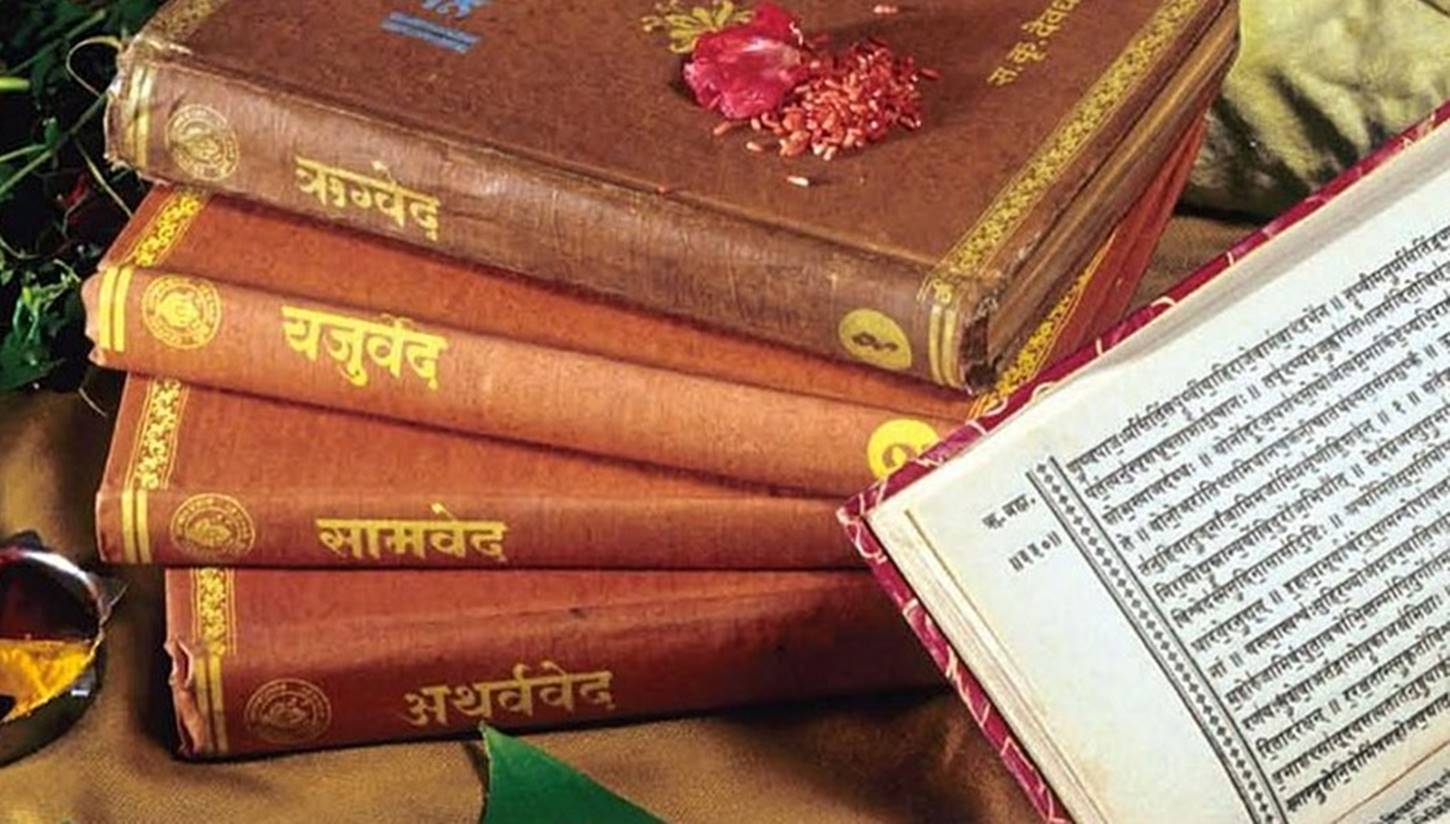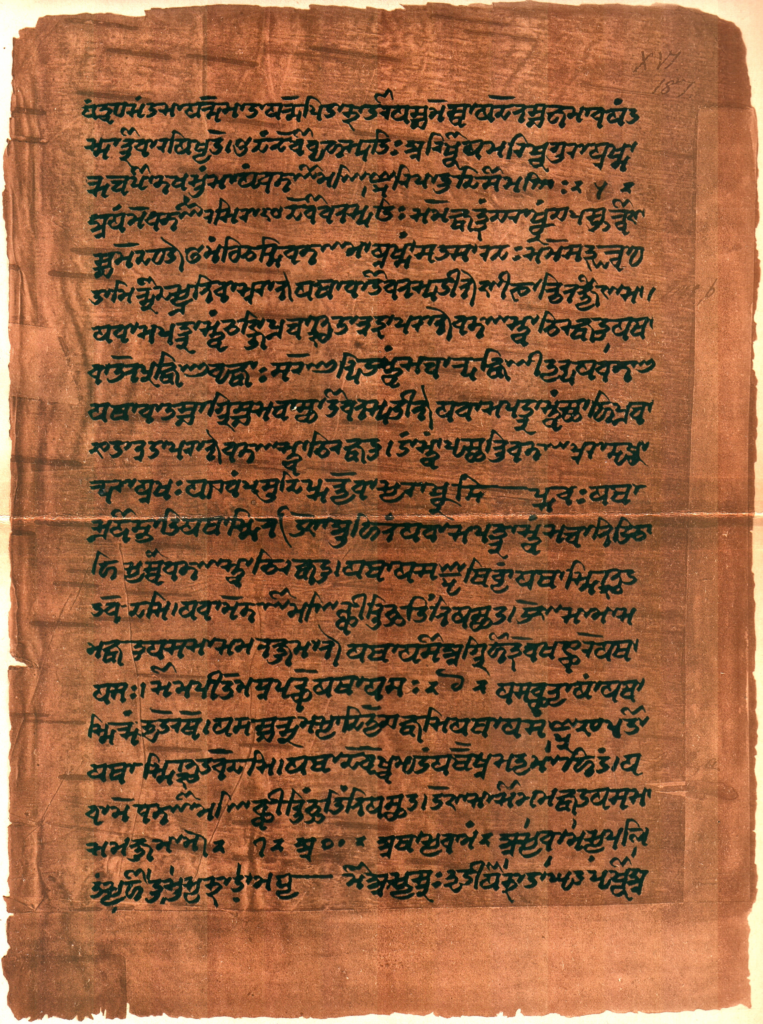
Indeed, the Vedas hold a central and revered position in Hinduism. They are considered the oldest and most authoritative scriptures in the Hindu religious tradition. The word “Veda” is derived from the Sanskrit root “vid,” which means knowledge. The Vedas are considered to be the revealed knowledge, heard by ancient sages during deep meditation.
There are four Vedas, each consisting of four parts:
- Rigveda: The oldest Veda, it is a collection of hymns dedicated to various deities, natural forces, and philosophical concepts.
- Yajurveda: This Veda contains prose and verse formulas that are used in rituals and ceremonies. It is divided into the Shukla (white) and Krishna (black) Yajurveda.
- Samaveda: Composed of chants and melodies derived from the Rigveda, it is primarily used in rituals.
- Atharvaveda: This Veda contains hymns and spells for everyday life, covering a wide range of topics such as healing, magic, and rituals.
The Vedas are not just religious scriptures; they also encompass a vast range of knowledge, including philosophy, astronomy, linguistics, and social sciences. Each Veda has associated Brahmanas (ritualistic explanations), Aranyakas (meditative and philosophical texts), and Upanishads (philosophical teachings).
The Upanishads, which are considered the culmination of Vedic thought, explore profound philosophical and metaphysical concepts, delving into the nature of reality, the self (Atman), and the ultimate reality (Brahman).
While the Vedas are highly revered in Hinduism, it’s important to note that Hinduism is a diverse and pluralistic religion with a wide range of beliefs and practices. Some Hindus may focus more on the Vedas, while others may draw inspiration from other scriptures like the Bhagavad Gita, the Ramayana, the Mahabharata, and various Puranas. The diversity within Hinduism allows for a broad spectrum of beliefs and practices, and individuals may emphasize different aspects of the tradition based on their personal inclinations and the particular sect or community to which they belong.
The statement you’ve made reflects a common belief among many Hindus about the Vedas. The Vedas are a collection of ancient religious texts that form the foundation of Hinduism. There are four Vedas: Rigveda, Samaveda, Yajurveda, and Atharvaveda. Each Veda is further divided into four parts: Samhitas (hymns), Brahmanas (rituals), Aranyakas (meditations), and Upanishads (philosophical teachings).
The belief that the Vedas transcend time and have no beginning or end is rooted in the idea that they are not man-made but are considered to be divine revelations. In Hindu tradition, it is believed that the Vedas were not composed by any human author but were revealed to ancient sages (rishis) during deep states of meditation. As such, they are often referred to as “apauruṣeya,” meaning not of human origin.
This belief in the eternal nature of the Vedas underscores their authority and sacredness in Hinduism. The Vedas are considered the ultimate source of knowledge and spiritual wisdom, and they are highly revered in Hindu religious and philosophical traditions.
It’s important to note that different sects and schools of thought within Hinduism may interpret and emphasize the significance of the Vedas in various ways, and beliefs can vary among individuals and communities.
Hinduism encompasses a vast body of sacred texts and scriptures, which are central to the religious and philosophical traditions of Hindu belief. These texts are revered and followed by millions of Hindus worldwide. Here are some of the most important and revered Hindu scriptures:
- Vedas: The Vedas are the oldest and most authoritative scriptures in Hinduism. There are four Vedas: Rigveda, Yajurveda, Samaveda, and Atharvaveda. These texts contain hymns, rituals, and philosophical teachings. The Vedas are highly revered and serve as the foundation of Hindu religious knowledge.
- Upanishads: The Upanishads are a collection of philosophical texts that explore the nature of reality, the self (Atman), and the ultimate reality (Brahman). They are considered the concluding part of the Vedic texts and are known for their deep spiritual insights.
- Bhagavad Gita: The Bhagavad Gita is a 700-verse scripture that is part of the Indian epic Mahabharata. It is a conversation between Prince Arjuna and Lord Krishna, who serves as his charioteer. The Gita addresses key philosophical and ethical dilemmas and provides guidance on duty, righteousness, and the path to spiritual realization.
- Ramayana and Mahabharata: These two epics are among the most well-known stories in Hinduism. The Ramayana narrates the life of Lord Rama, an avatar of Lord Vishnu, and the Mahabharata tells the story of the Kurukshetra War and includes the Bhagavad Gita.
- Puranas: The Puranas are a genre of ancient texts that provide narratives, myths, and legends related to Hindu deities and cosmology. There are 18 major Puranas, such as the Vishnu Purana, Shiva Purana, and Devi Bhagavata Purana.
- Dharma Shastras: These texts, including the Manusmriti, provide guidelines for ethical and legal conduct, social duties, and moral principles. They have influenced Hindu law and social practices.
- Smriti Texts: These texts are considered of secondary importance but are still influential. They include works like the Dharmashastra (legal texts) and various codes of conduct for different social roles.
- Vachanas and Keertanas: These are devotional and philosophical poems and songs composed by saints and poets. They are particularly prominent in the Bhakti and Sant traditions and are known for their emotional and devotional expressions.
- Agamas and Tantras: These texts are primarily associated with the Shaiva, Shakta, and Vaishnava traditions and provide instructions for temple construction, deity worship, and spiritual practices.
- Darsanas: These are philosophical systems within Hinduism that explore various aspects of metaphysics, epistemology, and ethics. The six classical darsanas include Nyaya, Vaisheshika, Samkhya, Yoga, Mimamsa, and Vedanta.
Hindu beliefs are deeply rooted in the teachings and philosophy found within these texts. However, it’s important to note that Hinduism is a diverse and flexible tradition, and different individuals and communities may emphasize particular texts or aspects of Hindu philosophy based on their personal beliefs and cultural backgrounds.

Hinduism is a diverse and ancient religion with a rich tapestry of beliefs and practices. While the Vedas are considered some of the most ancient and authoritative texts in Hinduism, Hindu beliefs encompass a wide range of ideas, deities, and philosophies. Here are a few key points to consider:
- Vedas: The Vedas are a collection of ancient scriptures that are highly revered in Hinduism. There are four Vedas: the Rigveda, Yajurveda, Samaveda, and Atharvaveda. These texts contain hymns, rituals, and philosophical teachings and serve as the foundation of Hindu religious knowledge. However, not all Hindus may engage with the Vedas directly, as they are often studied by scholars, priests, and those with a deep interest in Vedic traditions.
- Polytheism: Hinduism is known for its polytheistic nature, meaning it recognizes and venerates a multitude of deities or gods and goddesses. While some deities are considered more prominent, such as Brahma (the creator), Vishnu (the preserver), and Shiva (the destroyer), there are countless other deities, each representing various aspects of life, nature, and the universe. The number of gods and goddesses in Hinduism is often described as “more than a crore” (crore means ten million) to convey the vastness of divine manifestations.
- Henotheism and Monism: Hinduism also incorporates concepts of henotheism, where devotees focus on one particular deity while recognizing the existence of others, and monism, which emphasizes the unity of all existence, seeing the divine as ultimately formless and transcending the multiplicity of deities.
- Religious Diversity: Hinduism is not a monolithic religion but a diverse tradition that encompasses a wide range of beliefs, practices, and sects. Various denominations and schools of thought within Hinduism may emphasize different deities or philosophical concepts.
- Personal Belief: Belief in and devotion to specific deities or philosophical ideas within Hinduism can be highly personal. Individuals may have their own preferences and interpretations of Hindu theology.
- Worship and Rituals: Hindu worship practices often involve the offering of prayers, rituals, and offerings to one or more deities. The choice of deity may depend on personal preference, family tradition, or regional customs.
In summary, Hinduism is characterized by its diverse and inclusive nature, where there is room for a wide array of beliefs and practices. While the Vedas are foundational, many Hindus may not directly engage with them, and the belief in numerous deities is a hallmark of Hindu polytheism. Ultimately, Hinduism’s flexibility and adaptability have allowed it to evolve and embrace a wide range of religious expressions and beliefs.

